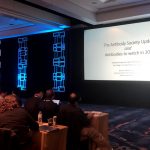The Antibody Society is pleased to be affiliated with mAbs, a multi-disciplinary journal dedicated to advancing the art and science of antibody research and development. We hope you enjoy these summaries based on the abstracts of the most read papers published in a recent issue.
All the articles are open access; PDFs can be freely downloaded by following the links below.
Issue 11.5 (July 2019)
In this Perspective article, Vasquez et al. examine data in two publications from the same research laboratory that report on structure-based in silico design of antibodies against viral targets without sequence disclosure, and find that the antibodies align with high sequence identity to previously reported antibodies of the same specificity. They note that the lack of reproducible computational algorithms and output sequences in the initial publications obscures the relationship to previously reported antibodies, and sows doubt as to the genesis narrative described in the publications.
In their companion Perspective article, De novo discovery of antibody drugs – great promise demands scrutiny, mAbs’ Assistant Editors Jonny Finlay and Alex Lugovskoy discuss the real-world issues and the concerns raised by Vásquez et al., which suggest much more work is needed to realize the bold vision of delivering in silico designed antibody therapies to patients.
Bivi et al. used anti-drug antibody (ADA) assays to detect and measure pre-existing reactivity or the ability of a molecule to produce an ADA-like response in serum from treatment-naïve, healthy donors. They report that the magnitude of pre-existing reactivity evaluated pre-clinically and expressed as the 90th percentile of Tier 2 inhibition correlates with the subsequent rate of ADA emergence in the clinic. Using the components of an IgG-scFv bispecific antibody in the Tier 2 step of the ADA assay, they identified the scFv as the target of the serum pre-existing reactivity. Most importantly, the domain specificity of pre-existing ADA was the same as that of the treatment-emergent-ADA from patients treated with the molecule. Based on these data, they propose the evaluation of the magnitude and of the domain specificity of pre-existing reactivity as a powerful tool to understand the immunogenic potential of novel biotherapeutics.
In this new report, Asensio et al immunized mice that transgenically express human antibodies with either programmed cell death 1 protein or cytotoxic T-lymphocyte associated protein 4 using four different immunization protocols, and then utilized a single cell microfluidic platform to generate tissue-specific, natively paired immunoglobulin (Ig) repertoires from each method and enriched for target-specific binders using yeast single-chain variable fragment display. The data suggest that, although different immunization protocols may generate a response to an antigen, performing multiple immunization protocols in parallel can yield greater Ig diversity. They conclude that modern microfluidic methods, followed by an extensive molecular genomic analysis of antibody repertoires, can be used to quickly analyze new immunization protocols or mouse platforms.
Parthiban et al report on use of their mammalian cell libraries of up to 10 million clones displaying a repertoire of IgG-formatted antibodies on the cell surface. TALE nucleases or CRISPR/Cas9 were used to direct the integration of the antibody genes into a single genomic locus, thereby rapidly achieving stable expression and transcriptional normalization. The authors used the system to affinity mature a PD-1-blocking antibody through the systematic mutation and functional survey of 4-mer variants within a 16 amino acid paratope region. Mutating VH CDR3 only, they identified a dominant “solution” involving substitution of a central tyrosine to histidine, but this variant was surpassed by a lysine substitution when light chain variants were introduced. This comprehensive and quantitative interrogation of sequence space was achieved by combining high-throughput oligonucleotide synthesis with mammalian display and flow cytometry operating at the multi-million scale.
Ellwanger et al. report on the redirected optimized cell killing (ROCK®) antibody platform, which comprises a plethora of CD16A-binding innate immune cell engagers with unique properties. In particular, they discuss the advantages of innate immune cell engagement over classical monoclonal antibodies and other engager concepts, and present details on its potential to engineer a fit-for-purpose innate immune cell engager format that can be equipped with unique CD16A domains, modules that influence pharmacokinetic properties and molecular architectures that influence the activation of immune effectors, as well as tumor targeting.




